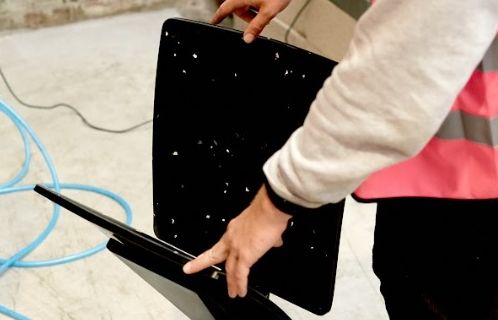“It all starts with a student project,” explains Marius Hamelot, co-director of the company Le Pavé. For more than a year, he went to meet craftsmen, architects but also recycling players, to try to meet the objective set by the European Union to reduce gas emissions by half. greenhouse gas emissions by 2030. “It’s like trying to rethink an entire system in just seven years,” he continues. To “try to find solutions”, he seeks to reduce emissions in the building sector, which generates 23% of French greenhouse gas (GHG) emissions, according to the government websitet.
An ambitious environmental approach, launched with his childhood friend, Jim Pasquet, with whom he grew up in Brittany. One studied business, the other studied architecture. In 2018, the two Séquano-Dionysians together founded Le Pavé, a company specializing in the construction of sustainable materials. The following year, the Boing company, for which they worked as suppliers, won a call for tenders organized by the Olympic Games Organizing Committee (Cojo).
Le Pavé is in charge of the construction of the seats of the future Olympic swimming pool as well as Paris Arena II, built for the Paris 2024 Olympic Games. In total, the company will build 11,000 seat backs, 8,000 for the seats of Paris Arena II and 3,000 for those at the Olympic swimming pool. To do this, more than one hundred tons of recycled plastic will be needed. About 80% of the plastic waste collected comes from Île-de-France.
“It’s a real technical challenge”
Constructed from two types of recycled plastic materials, bottle caps and polystyrene, these seats will be 100% recyclable. Eventually, the co-leaders would like to use up to eight different types of materials. “The idea is to integrate these materials into the building sector over the long term, giving them value, while retaining the possibility of recycling,” explains the entrepreneur. In several years, we will be able to make oil from these seats. »
“Our initiative doesn’t exist anywhere else, so it’s a real technical challenge,” he continues. Originally, we produced panels. We managed to make high-performance seats by working with other industries that helped us thermoform our plates. The important thing is to build seats that are durable over the long term. They have been tested for resistance to tearing, resistance to chlorine and UV. But the secret of their design lies above all in the establishment of a real collaboration.
“It was not us who designed the seats but the company Master Industrie”, which also takes care of the metal parts of the seats. “Besides, we are not recyclers, continues Marius Hamelot. There are already companies specializing in this. Our role is to build a bridge between the world of construction and that of waste. As a way of opening up the field of possibilities.
“Adapting to the needs and challenges of ecological transition”
Last May, already 70% of the seats were already produced. A first (large) part of the seats has been placed in the Olympic swimming pool. By taking part in the organization of a major event, like the Paris 2024 Olympics, the leaders of Le Pavé have the opportunity to make themselves known internationally. A godsend for those who plan to internationalize their business.
Until now established only in Île-de-France and Brittany, where they grew up, they wish to deploy in all French regions within three years. Then, internationally “to adapt to the needs of the challenges of ecological transition and the scarcity of resources”.

